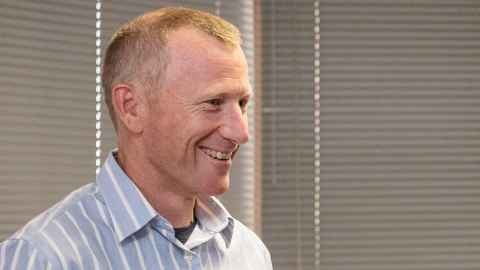Why you should go jump off a table
15 August 2019
Stress might be bad for our mental health, but subjecting our bones to stress is likely to be good for them, and the earlier the better, says Associate Professor Thor Besier.

“If you want to excite the bones, and get your bones to respond to that, the best thing you can do is jump off a table,” he says. “Do that ten times, and your bones will receive more stimulus than if you went for a walk for two hours.”
Dr Besier, of the Auckland Bioengineering Institute, will be talking about the relationship between biomechanical loading and bone health at Raising the Bar this month, an event at which 20 top academics from the University of Auckland will speak at ten inner city bars on one night.
Our skeletal matter is roughly determined by our DNA, but it’s now well known that it constantly adapts to the stresses of life, says Dr Besier.
It’s also important we subject our bones to stress while we’re still young enough to be building them. This will have implications throughout our life, and our risk of bone diseases such as osteoarthritis and osteoporosis.
Dr Besier points to studies that have looked at baseball pitchers, in which the bone shape and density of the throwing arm was compared to the non-throwing arm, which demonstrated a direct link between biomechanical loading and bone health.
“What’s really intriguing is that bones show that difference, 30 or 40 years after people stopped playing the sport. The bone formation that occurs when you’re young will stay with you throughout your life.”
“What this means is that what our children are doing when they’re still at school, will set them up for joint disease - or not - in 40 years time.”
The bone formation that occurs when you’re young will stay with you throughout your life.
It’s never too late to exercise, he says, but the younger, the better and the ‘how’ is also important. “In the classroom, if you make the kids get up and do ten star jumps every 20 minutes, that could be enough to stimulate bone growth.”
By getting a better understanding of the interaction between biomechanical loading and bones health, Dr Besier and his team plan to radically improve orthopaedic care. Our ageing population makes this a healthcare priority.
“We’re expected to have a 700 percent increase in joint replacements in the next 15 years. We can’t afford to sustain that.
People are wanting to live long happy healthy lives, but their joints are failing, so what are we going to do about that?”
His research has led to the development of spinout company, Formus Labs, set up to design software that will make pre-operative planning easier, less intrusive and more personalised.
That involves designing tools that can use medical images to recreate a computational model of an individual’s anatomy, and the design of a joint product specifically tailored for each patient.
Formus Labs is working with a number of major international orthopedic companies to develop and test the technology. Dr Besier is also leading research that uses wearable sensors developed at the ABI, to improve post-operate orthopaedic care.
The sensing technology led to spinout company, IMeasureU, and has since been sold to VICON, a UK-based motion capture company, which has led to greater distribution of the wearable sensor products.
If used in orthopaedic post-operative care, he says, it would enable doctors to keep track of patients over time and, “like a FitBit on steroids”, get a better idea of how well a patient is moving after being discharged from hospital.
“If you get a joint replacement tomorrow, your first question is, ‘when can I be active again, can I go running, can I play golf?’ And we don’t have good answers to these questions, and that’s a problem for the patients, as they have no idea what they should be doing. So we want to address that,” says Dr Besier.
“Our plan is to be game-changing for orthopaedic care.”
Raising the Bar, 27 August, 20 talks, 10 bars, one night.
Media contact
Margo White I Media adviser
DDI 09 923 5504
Mob 021 926 408
Email margo.white@auckland.ac.nz
Want to help us make a difference?
There are many ways you can make a difference and support the Auckland Bioengineering Institute - you can make a donation or bequest, or even subscribe to our newsletter.